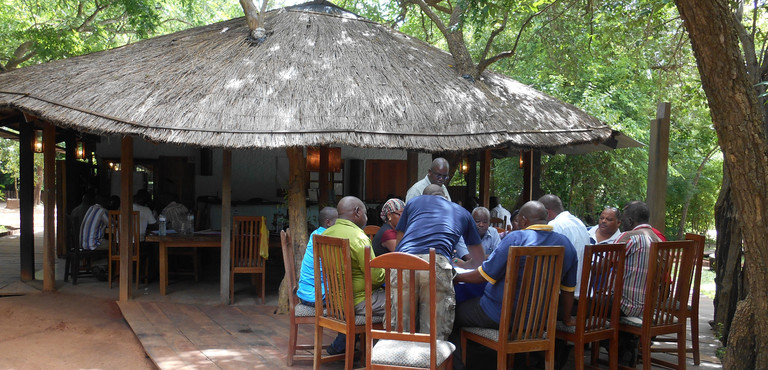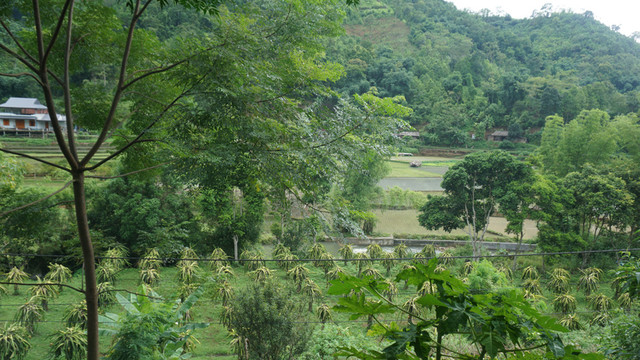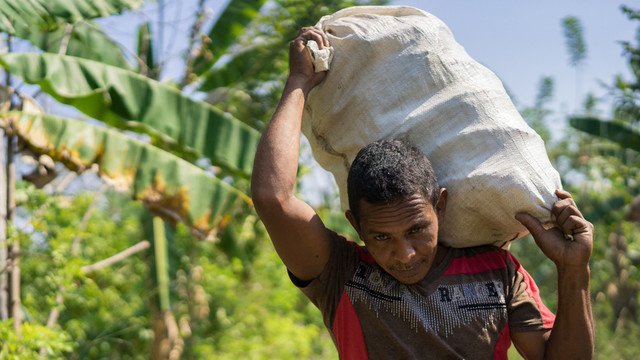Mozambique's forest theatre – how will the play end?
Conscious that speaking at a training event for Mozambican Simple License loggers required some theatrical flourish to hold attention in the sub-tropical heat, Duncan Macqueen took to the stage.


Local logging bosses ('patrons') attend a training session on business organisation and forest management in the remote miombo forest near Caia in Central Mozambique (Photo: Duncan Macqueen/IIED)
The cast are chiselled. The theatre remote. But what is playing out here is edge-of-the-seat stuff. Local logging bosses ('patrons'), both men and women, are gathered in Caia in search of better future. For many they have pariah status.
Five-year Simple Licences that permit their activities are widely blamed for unplanned, unsustainable and often illegal logging (which in 2013 made up 93 per cent of all logging in Mozambique). Their operating costs are often pre-financed largely by Chinese timber traders – 93 per cent of Mozambique's timber exports end up in China (PDF).
They have survived innumerable environmental clamp-downs. They remain resilient. Their occasionally loud and jocular confidence is built on a track record of solving daily problems within a difficult operating environment. Honestly, they are fun to be around. They live a forest life and love it.
But times are changing, the perception that forests are infinite has long gone, and bigger problems must now be solved.
What can Seuss produce?
When younger, I loved Dr Seuss's book 'The Lorax'. It charts the demise of the Truffula Trees under the axe of the Once-ler "to make sneeds that everyone needs". There are no Truffula Trees in Mozambique. But the local equivalents of Chanfuta, Umbila, Jambirre, Mondzo and Pau Ferro are equally exotic and precious. They too are made into things that everyone needs. Commercial timbers, and to a lesser extent the Miombo forest itself are running out (at a rate of 219,000 hectares per year).
As an adult, what I now hate in 'The Lorax' is that, as the last Truffula Tree falls, the Once-ler and his relations head elsewhere. Only the reader is urged to plant trees. What wonderful but sentimental nonsense! The Once-ler and his relations should have stayed and solved the problem. Mozambique's Simple License holders want to do just that.
IIED's deliberate engagement with these local logging 'patrons' in a series of dialogues and trainings might seem strange. But these characters are not environmentally malicious. They are acutely aware of what the future holds if current operating practices persist. And who better to address deforestation than these very people whose livelihoods depend on trees.
Eight hours by car to Caia
Part of this engagement process involved a business organisation and forest management training session in the remote Miombo forest frontier in Caia – eight hours by bumpy road from the city of Beira in central Mozambique.
Various groups of local logging patrons are suggesting that they combine the smaller Simple License areas into bigger, longer-term concessions that would allow sustainable forest management to become economically viable. This could then underpin investment in processing technology which would add value to logs currently sold at what the patrons refer to as "the price of bananas".
It's not a bad idea. But making it work first requires organisation among forest producers. They need to structure how a joint business would work, who would be responsible for what, and how they would manage the shift from being multiple independent 'patrons' (responsible for all activities) to playing differentiated roles within that new business structure.
So new emphases are needed, not just on restructuring the business, but also to develop strong leadership, new business roles, transparent finances, a skilled workforce, and a network of contacts with various government authorities from whom they must seek license to operate.
This scale of enabling investment does not come cheap. Getting 27 local logging patrons together with government staff and local NGOs to undergo training on business organisation, financial management and forest management planning is just a start.
Fortunately, global concerns over the contribution of deforestation to climate change have led to new finance streams aimed at Reducing Emissions from Deforestation and Forest Degradation (REDD+). Indeed, it is from within a Norwegian-funded project, Testing REDD+, that this IIED work is financed.
We are not just working with the local logging patrons in Mozambique. Testing REDD+ is trialling three other different models to halt deforestation.
We are engaging local farmers around the idea of conservation agriculture to minimise deforestation from expanding farm areas. We are engaging charcoal producers in improving the sustainability and efficiency of timber harvesting, kiln processing and end-use to combat that source of deforestation. And we are working with rural entrepreneurs to develop sustainable business alternatives based on renewable non-timber forest products – again taking pressure off the forest.
In each case, enabling investments that organise Mozambican forest farm producers into more profitable and more sustainable business structures holds the key to reducing deforestation.
Every drama needs actors
But the actors in this drama are not just the Mozambican forest farm producers. Chinese timber traders also play a key role. So in the spirit of engaging those that matter, IIED and partners are talking directly to those Chinese operators, partnering with and building on initial work by WWF.
Ways to incentivise improvements in the Chinese operators' practices will be negotiated as part of the British-funded China-Africa Forest Governance Project. Part of that work will be to ask Chinese operators how they might support the emergence of more organised and sustainable groupings of local logging Patrons.
And this particular drama is not just playing out in the Mozambican theatre. Organising local forest farm producers into more profitable and sustainable business structures is also an approach being used to tackle deforestation successfully in more than 10 other countries through the Forest Farm Facility (FFF).
The FFF is a multi-donor fund, co-managed by the Food and Agriculture Organisation of the United Nations (FAO), the International Union for the Conservation of Nature (IUCN) and IIED, and backed by yet another group of donors (in this case Sweden, Finland, Germany, USA and the European agri-agencies Agricord). It works to strengthen producer organisations for sustainable business, improve their engagement with government policy-makers, and better represent their voices in international agendas that are likely to affect their local business operations.
IIED's responsibility for the knowledge and learning component of the FFF directly informs the specific approaches and tactics to use in countries such as Mozambique.
So the choreography here on this remote stage in Mozambique is complex. It involves many different sources of support and many different casts of characters. It's a real-life drama. Only the main actors can define how the play ends.
From what I have seen here – they are rooting for a happy ending, not a Shakespearian tragedy. Helping set the scene for the former is important because however indirectly, the outcome of this play will affect us all.
Duncan Macqueen (duncan.macqueen@iied.org) is principal researcher in IIED's forest team within the Natural Resources Group.



